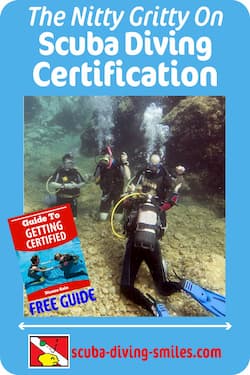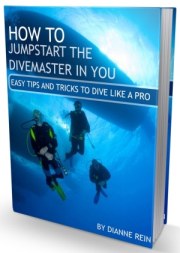Surviving Panic While Scuba Diving
by Rick Spencer
(Remington, VA USA)
Hello, my name is Rick. I learned to dive in the late 1980’s as part of a community college program. I have been asked to share two “war stories” about panic; one of the most dangerous situations a diver can experience.
The first incident of panic occurred during my open water certification. At the time, I lived near a quarry that had been turned into a training site by one of the dive stores in my area. The quarry had been set up with platforms so that groups could go through various exercises at 33’.
On this particular dive, I was the only student. The instructor went over the plan and the tasks we were going to accomplish. The last item would be a buddy breathing exercise.
Everything was going to plan when the instructor signaled it was time to buddy breath. Alternate Air Source devices had just started becoming common place, but running through the sharing of a single second stage was still good practice.
We moved into position, grabbing hold of each other’s BCD. I took a breath and started to exhale and passed my regulator to the instructor. As soon as it was out of my mouth I knew I was exhaling too fast. I thought of reaching for the alternate but thought it would be a bad idea.
Seconds later, the panic set it and I kicked off the platform for the surface. The instructor grabbed my weight belt, forced me back to the platform and shoved the regulator back into my mouth.
The second panic instance took place at the same quarry a few years later during a night dive for Advanced Open Water. This time I was with a group and had a buddy. The instructor ran through the plan. The quarry has a vertical wall; the plan was we would surface swim to the wall and as a group head to the bottom then swim off to the platform. We tied green chemical sticks to our tanks, did a check and got wet.
The group met at the spot and we started down. My buddy and I arrived on the bottom together and looked in the direction of the platform for the other divers…we could not see the group, the green chem. lights, or flashlights.
We signaled each other that we didn’t know which way to go…instead of getting lost in the dark we mutually signaled to head up. I began the process of swimming to the surface when my fin kicked off of one of the anchoring cables running from the platform to the wall and in my mind and confusion the thought came to me that I wasn’t going up. I started to kick faster and had the sensation that I wasn’t getting enough air and that I should spit out my regulator.
One of the things that the classroom sessions had covered was this very impulse and the words came back to me, “You’ll want to spit it out and breath…and you will not survive. Fight the impulse, it will pass quickly.” I finally made it to the surface and inflated my BCD until the over-inflate valves popped. We related our experience to the group when everyone was back on the beach.
Lessons learned:
Plan the Dive, then Dive the Plan
In both situations, the plan was reviewed and followed. After a few decades of retrospect, the only thing I would have changed is to add signals that indicate a problem as well as landmarks and compass bearings.
Know your equipment and use it
Alternate Air Sources are pretty standard in today’s diving. Learning the Buddy Breathing process should still be a part of your buddy system, but as a last resort. Don’t be afraid to use the device.
Know your partner
There are specific signs of panic that can be recognized. The biggest sign is that a person’s eyes open very wide. Thankfully, my instructor saw my panic and stopped my accent. Two weeks later, same quarry, same buddy breathing exercise, a teenaged girl was not so lucky and died of Lung Expansion.
My goal in sharing these stories is to help others learn from my experiences. At some point everyone faces a degree of panic. Planning, preparation and communication will help you through the problem. Listen to the sages…learn the emergency procedures, know your equipment and your capabilities. Be prepared for the unexpected and know what to do ahead of time.
Comments for Surviving Panic While Scuba Diving
|
||
|
||
|
||
|
||
|
||
|
||
Want to stay down longer and improve your buoyancy control and other diving skills? Our free report "Increase Your Bottom Time" along with our practical, weekly actionable tips will have you looking like a seasoned diver in no time. So come join us and see improvement on your very next dive!
(Click on the photo to join us now!)
What's New
-
Unofficially Summer
May 25, 24 07:19 AM
Well it is finally here. Memorial Day weekend and the unofficial start of summer! Wishing everyone a happy and healthy holiday weekend. Hopefully the weather cooperates wherever you are and you will b… -
Happy New Year
Jan 01, 24 06:00 AM
Happy New Year everyone! I hope everyone is well and had a fun New Years Eve! May your new year be filled with lots of wonderful dives. All the best to you and yours in 2024! Let the dives begin. -
Happy Holidays
Dec 14, 23 05:05 AM
I hope everyone is enjoying the holiday season! I am always amazed at how fast time flies and another year is just around the corner. I wanted to pop in and say hi to everyone. I am doing some full ti… -
3 Common Scuba Diving Mistakes New Divers Make
Feb 23, 23 02:18 PM
In this video, I share 3 common scuba diving mistakes beginner divers make. Learn how to correct these for a better - and safer - dive. -
Scuba Diving Tipping Etiquette: How Much And When To Tip Scuba Crew
Feb 06, 23 03:34 PM
Not sure of scuba diving tipping etiquette? In this video I share who to tip, when to tip, how much to tip, tipping on liveaboards, tipping an instructor & more










